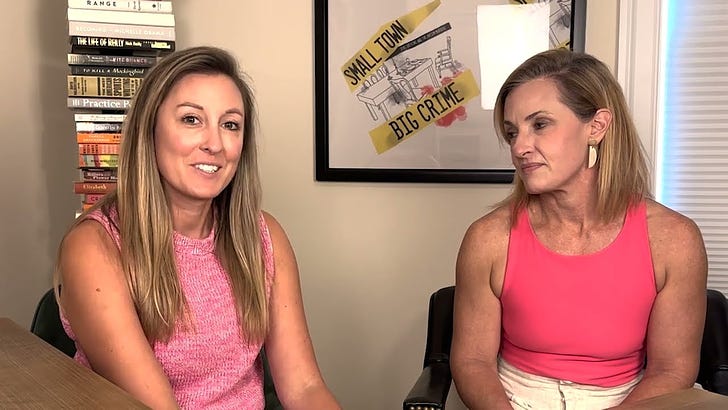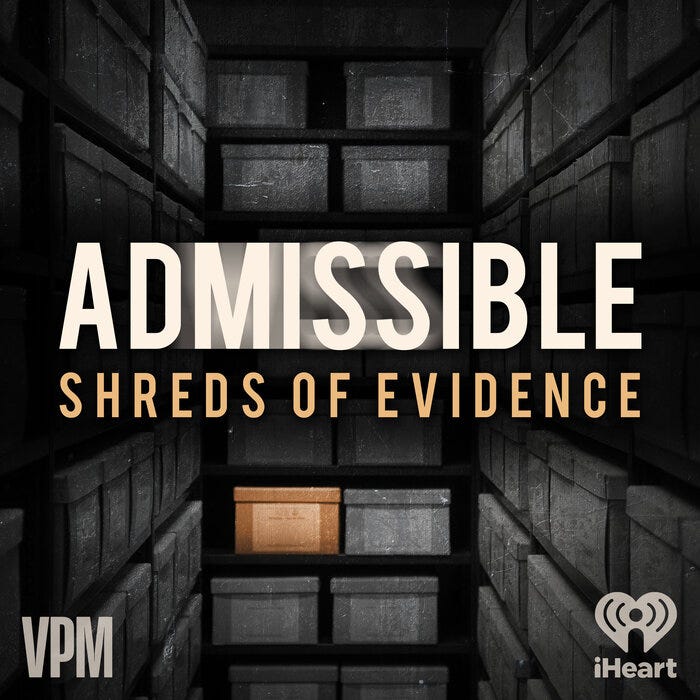Corruption in the Virginia Department of Forensic Sciences and the Söring Case
A new podcast raises troubling questions about the work of Mary Jane Burton, who testified at Jens Söring's trial.
The journalists of Small Town Big Crime have a fascinating interview with the maker of a podcast called Admissible: Shreds of Evidence:
Defense lawyers in Virginia and elsewhere have long known that there were problems with the work of Mary Jane Burton, a blood-type analyst at the Virginia Department of Forensic Sciences in the 1970s and 1980s (she retired in 1988). The new podcast, created by Tessa Kramer and Ellen Horne, has uncovered huge amounts of damning information going beyond what was previously known, including Burton apparently falsifying results, destroying documents, and even massaging results to help the prosecution.
I haven’t listened to the Admissible podcast yet, but the summary presented by its creators looks hugely damaging. Horne and Kramer also recount how frustrated they have been by Virginia’s response, which has involved more stonewalling than cooperation. They note that the Virginia Post-Conviction DNA Testing Program and Notification Project, in which the State of Virginia used new DNA testing to test convictions from the 1980s (when Burton was active) led to the exoneration of 13 inmates. The podcast creators (both sets) suggest that Virginia should go beyond DNA testing and review every case in which Burton was involved, which strikes me as a sensible proposal.
What does his mean for Söring? As Courteney Stuart and Rachel Ryan of Small Town, Big Crime conclude, not much. First of all, there can be no question of Curtis “tailoring” blood-group analysis results to frame Söring, since her forensic report was produced long before the authorities knew what Söring’s blood type was. Second, Burton’s analysis actually helps Söring’s case. First of all, Type O blood, the kind she found at the crime scene, is extremely common: something like 45% of Americans have Type O blood. The fact that this is Söring’s blood type thus just isn’t all that incriminating.
But the key reason Söring doesn’t want to challenge Burton’s results is that they are key to his “two unknown men” narrative. Back in its heyday, this narrative went like this: “In 1985, serologists determined that there was Type O blood at the crime scene, which everyone assumed must be Söring’s blood. However, in 2009, DNA tests showed that male DNA from two of these Type O samples did not match Jens Söring’s DNA, and each DNA profile was slightly inconsistent. This proves two unknown men bled at the crime scene”. For Söring’s theory to work, therefore, the Type O grouping must be correct, since it differentiates the blood samples from those of the victims, who had Type A and AB blood.
Team Söring has been aware of this issue for years. Mary Jane Burton’s work has been challenged in many other cases, and attorneys, including some high up in the Innocence Project, have distrusted her work for years. Team Söring debated internally whether to vigorously challenge her work in his case, but decided not to do so. They have raised questions about it, but have not suggested her work on Söring’s case was clearly wrong in the Söring case. Instead, they concluded that it was more expedient to accept Burton’s initial testing and weave it into a new narrative. That was probably the right decision.
However, as Stuart and Ryan point out, the “two unknown men” narrative has now essentially collapsed. Stuart and Ryan obtained DNA samples which excluded the “deadly drifters” as having left any of the remaining testable DNA at the crime scene. Independent DNA experts have concluded that the most likely source of the small number of fragmentary male DNA profiles found at the crime scene was Derek Haysom, and even one of Söring’s own experts, Dr. J. Thomas McClintock, has admitted this could be the case.
So ultimately this new podcast looks like it may well uncover problems with hundreds of Virginia cases. One can only hope the authorities in Virginia will react appropriately by re-investigating cases in which inaccurate or falsified blood-type evidence may have played a role in a wrongful conviction. But Jens Söring’s case simply isn’t one of those.





Well this is hot shit. I would like to know what kind of motive Burton had at this time to modify results or swabs? The fact that all swabs which had been tested in 2009 for DNA had lead to results which obviously show partly DNA profiles of Derek Haysom, proves that the swabs that Burton had kept all these years should really belong to the Haysom case and not another case!!
BUT the case has two unanswered questions forensically:
1) Why wasn't Derek's blood not be investigated for DNA in 2009?!!! Same for fibers and hairs from the crime scene with blood on it...related to the killings!
2) Why was it possible that Derek's non blood (no mixture) DNA did survive all the blood DNA in the different relevant spots of blood types.
Could it be possible that Burton had contaminated those swabs with fibers from Derek??? (with or without intent)?
That could be a plausible answer!
Once and for all....the two drifters can be excluded only by blood type and NOT by DNA as the results are inconsistent. Otherwise Soering would had been excluded also cause it's not his DNA....to use stereotyped arguments in two directions about the same forensic fact doesn't sound very serious!
It does not make any difference, as far as I am concerned. Mr Soering could ask for new DNA Test but he does not - or does he? .... Long time no hear or see from Mr Soering, his former supporters or anyone else.